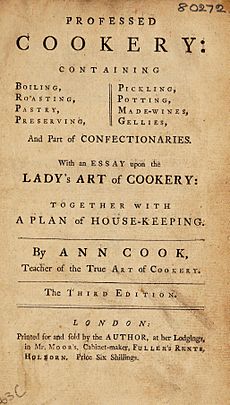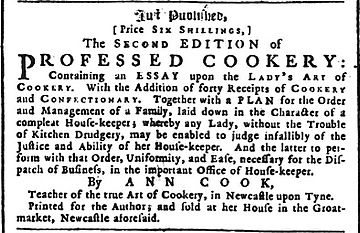Ann Cook (cookery book writer) facts for kids
Ann H. Cook was an English writer of cookbooks and an innkeeper. She lived from about 1725 to around 1760.
Ann Cook and her husband, John, lived in Hexham, Northumberland. They got into a big disagreement with a powerful local landowner, Sir Lancelot Allgood. This happened after an argument about a bill the Cooks had sent. Even though the Cooks were later found to be innocent, Allgood kept bothering them. He forced them to leave their inn and move.
They faced many money troubles. John was even put in a special prison for people who owed money. To earn money, Ann Cook wrote a cookbook called Professed Cookery in 1754. This book had many recipes. It also included a poem and an "Essay upon the Lady’s Art of Cookery." These parts were a strong criticism of Allgood's sister, Hannah Glasse. Hannah Glasse had written a very popular cookbook called The Art of Cookery Made Plain and Easy in 1747.
Professed Cookery was published three times: in 1754, 1755, and 1760. In the first two books, Ann Cook was said to live in Newcastle upon Tyne. In the third book, she was living in Holborn, London. We do not know exactly when or where she was born or died.
Contents
Ann Cook's Early Life
We don't know much about Ann Cook's early life. She was probably born in the late 1690s in County Durham. Ann wrote a short story about her life in her cookbook. She said she worked as a cook and a housekeeper.
She married John Cook around 1725 or 1727. He managed the Black Bull Inn in Hexham, Northumberland. The couple had at least two daughters and three sons. Their oldest daughter was born in 1728.
The Disagreement with Sir Lancelot Allgood
In 1739 or 1740, a judge and his group were visiting Hexham. Sir Lancelot Allgood, who was an important local official, asked John Cook to get six bottles of good French wine for them. The judge did not like the wine. He asked Allgood to borrow some from his estate. Allgood sent the judge some wine as a gift.
Since the first six bottles were used, John Cook charged them to Allgood's account. When Allgood and the judge met, they mistakenly thought John had charged the judge for the gifted wine. Allgood publicly accused John of cheating him. He threatened to ruin John's business. This started a big disagreement between them. Ann Cook defended her husband, which made the problem worse.
Moving and Money Troubles
In late 1745, the Cooks moved from the Black Bull Inn. They went to Morpeth, Northumberland. There, they ran the Queen's Head inn for its owner, Thomas Pye. They signed a special agreement to secure their position. The Cooks did not know that Pye was a cousin of Allgood.
In 1746, Allgood accused Ann Cook of being a dishonest person and a Jacobite. At that time, the Jacobite uprising was causing fear in northern England. The problems continued in 1749. Pye spread a false rumor that the Cooks were selling their things because they were broke. He said they were about to leave town.
In truth, they were giving some items to their oldest daughter. She had recently married and was running an inn in Newcastle upon Tyne. By this time, the Cooks had paid back most of their debt. They sold many of their remaining goods. They also moved to Newcastle. They planned to open a pastry shop there.
But their creditors followed them for the rest of the money they owed. They would not let the Cooks pay it back easily. John was taken to a special jail for people who owed money within a month of their arrival. We do not know what happened to John Cook after that.
Ann Cook Writes a Cookbook
To earn money, Ann Cook wrote a cookbook. It was first called The New System of Cookery. It was available for sale by February 1753. The book's title page said it was "sold by the Author, at her House in the Groat-market" in Newcastle.
When the book was officially published in 1754, its title was Professed Cookery. This book also included a poem and an "Essay upon the Lady’s Art of Cookery." Both the poem and the essay were a strong criticism of Hannah Glasse. Hannah Glasse had published her popular cookbook, The Art of Cookery Made Plain and Easy, in 1747. Glasse's book was a best-seller. It made her one of the most famous writers of her time.
Ann Cook's criticism of Glasse filled 66 pages of her book. Part of the poem accused Glasse of plagiarism. This means copying someone else's work without giving them credit. The poem said:
Historians have described Cook's attacks on Glasse as very harsh. However, much of Cook's criticism about Glasse's recipes was fair. Glasse often made fun of how expensive ingredients were in other cookbooks. But many of her own recipes used unnecessarily fancy ingredients. Cook also pointed out Glasse's copying from other writers. Glasse did use many other sources without saying where they came from. For example, out of 972 recipes in her first book, 342 were copied or changed from other books without credit.
Later Editions of Her Book
A second edition of Professed Cookery was published in 1755. This version added a "Plan of House-keeping." Cook's address was again given as a house on the Groat-market.
A third edition of Professed Cookery came out around or after 1760. Its title page said that Ann Cook was living in lodgings in Holborn, London. She was staying at the house of Mr. Moor, a cabinet maker. We do not know what happened to Ann Cook after this last edition was published.
 | Laphonza Butler |
 | Daisy Bates |
 | Elizabeth Piper Ensley |



